#i love how you can see reflections of biblical lore in her story
Text
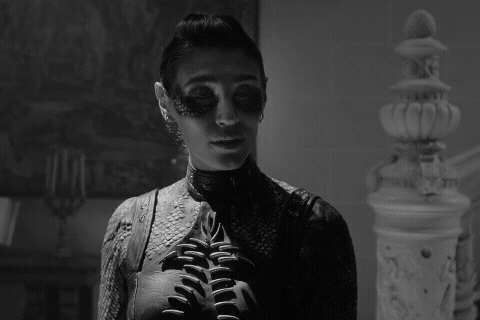
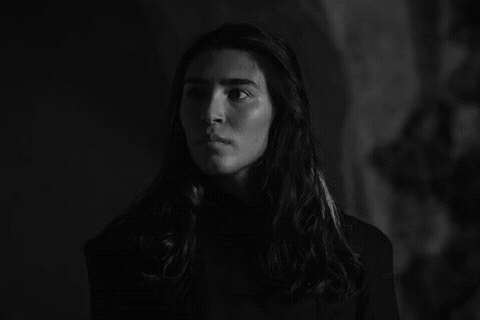
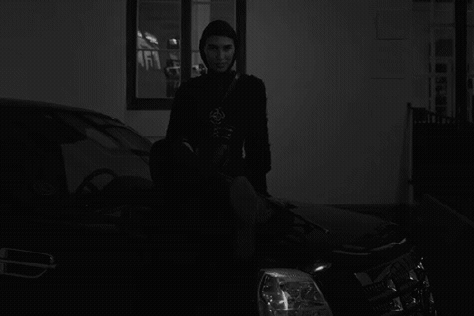
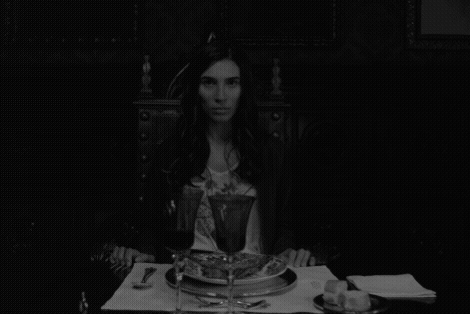
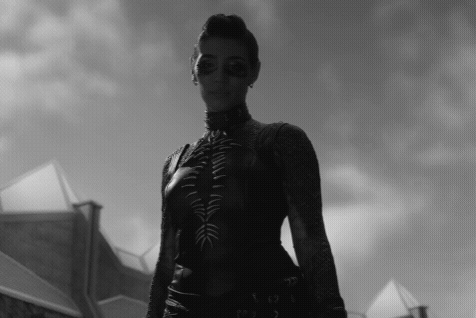
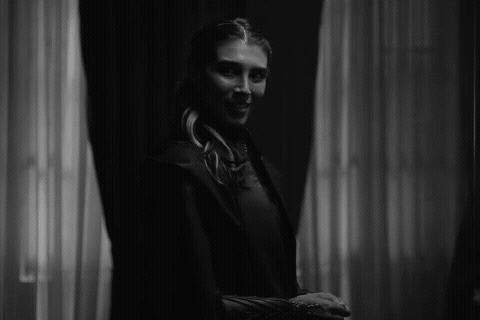
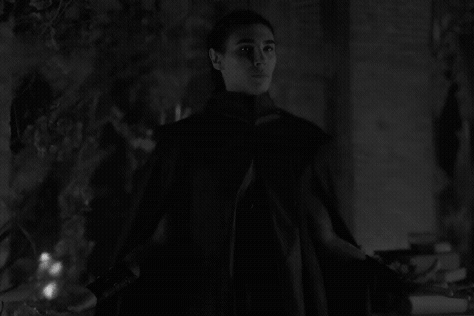
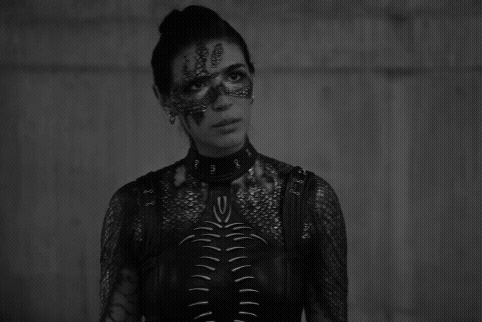
An endless list of favorite characters: Sister Lilith (Warrior Nun)
"You know my family, how I was raised. You know, you know I didn't have a choice."
#warrior nun#warrior nun gifs#warrior nun fandom#warrior nun edit#sister lilith#lorena andrea#favorite characters#warrior nun favorite#warrior nun gifset#wn gifs#wn gifset#wn fandom#wn edit#wn lilith#diary pages#my gifs#my gifset#and i'm ✨procastrinating✨#i love how you can see reflections of biblical lore in her story#veiled in diamonds [gif and edit archive]
33 notes
·
View notes
Photo

“False Friends” | Directed by Keith Gordon, Cinematography by Peter Levy
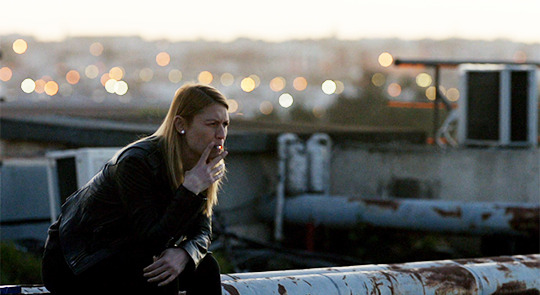
In case you hadn’t heard, Carrie smoked a few cigarettes this week. The opening of the episode is actually pretty interesting, the conversation with Yevgeny the previous night in the bar ringing in Carrie’s ears. (Carrie isn’t sleeping--again--and we all know that spells trouble for her.)
Carrie is, for the most part, a loner smoker. And a stress smoker. And a rooftop smoker, apparently! Here more than in previous instances where we’ve seen her smoke, the setting--all alone on the roof--visually represents her own headspace.
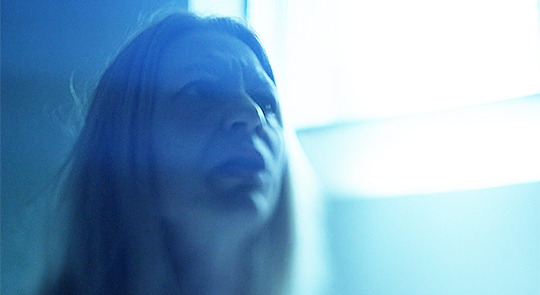
She flashes back to the scene we’ve seen several times already this season. This time, however, we finally see Carrie clearly. She speaks, she’s lucid. There is real fear in her expression, but also longing. The reveal of course is that Carrie is on her meds and in her right mind, and she doesn’t want Yevgeny to leave.
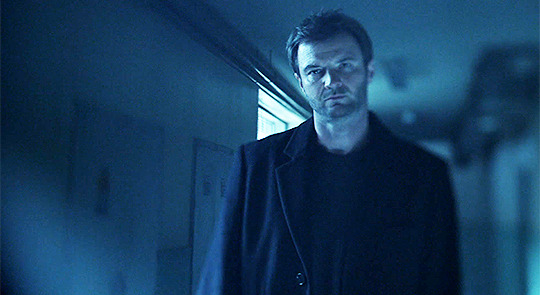
The camera turns to Yevgeny as Carrie’s dragged away. This is a shot we’ve seen already this season but, by the end of the episode, his expression takes on a different meaning. It’s not cold or detached. He doesn’t want to leave her either.
The repetition of this specific memory and the way it’s morphed over the episodes is remarkably similar to early season one Brody. We all knew the Carrie/Brody parallels this season would be heavy; the show is not only retelling that story with roles reversed but also using many of the storytelling devices they used in season one.
Then as now, the audience learns along with the characters what actually took place. First we learn that Brody actually did know Nazir; Nazir held him. Then we learn that Brody watched Tom Walker die. Then we learn that Brody is the one who beat Tom Walker to death (or at least he thought he did). The key difference obviously is that Brody was deceiving Carrie. Carrie is deceiving herself (or is she?).
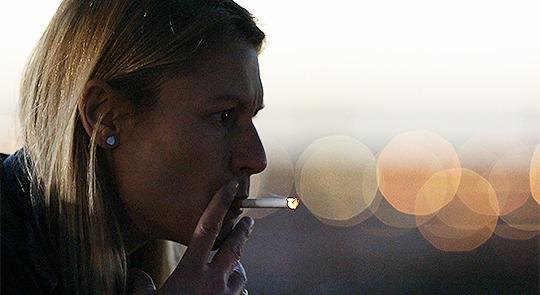
IJLTP. (Any time this show does something with bokeh IJLTP.) (Bokeh is the way a camera lens renders out-of-focus points of light.)
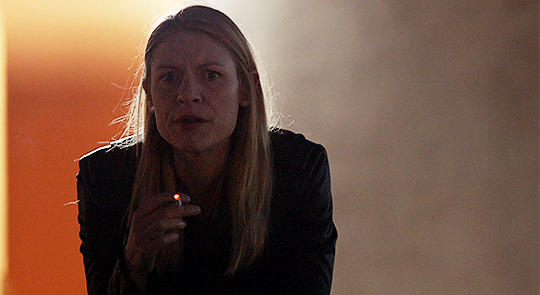
We thought the framing of this particular shot was interesting. There are two blocks of color behind Carrie, orange and white, and her body lies squarely in the center of either, one half on either side. Maybe this was completely accidental, or maybe it’s symbolic and indicative of the way she’s being pulled in different directions. She also remains in the dark--figuratively and literally. In the first episode of the season, Carrie was often framed inside rectangular boundaries, now she’s half-in, half-out. Before, she felt trapped in the car, in her bedroom, in the fenced-in basketball court. Now, she finally gets some freedom (and maybe a dollop of “fresh” air, natch).
(There is a similar Mad Men shot that Sara thinks about at least weekly that conveyed something similar about Don.)
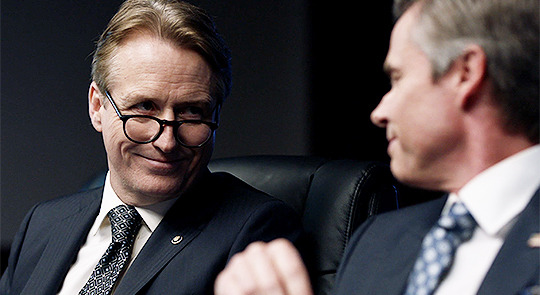
Linus Roache’s performance as David Wellington is fairly underrated. It’ll be interesting to see him in a context other than “Elizabeth Keane’s mouthpiece/bodyguard/sounding board/good cop/bad cop.” For example, this passive aggressive grin at new VP Ben Hayes when he makes a similarly passive aggressive comment about Princeton.
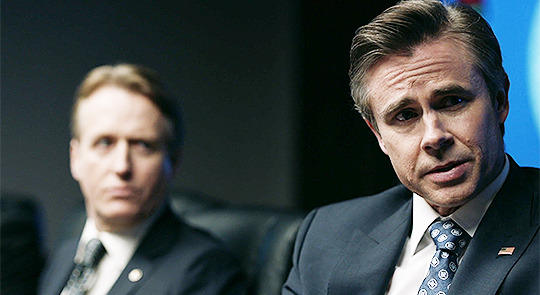
...or this side eye when Ben Hayes suggests firing Saul, a “Keane holdover.”
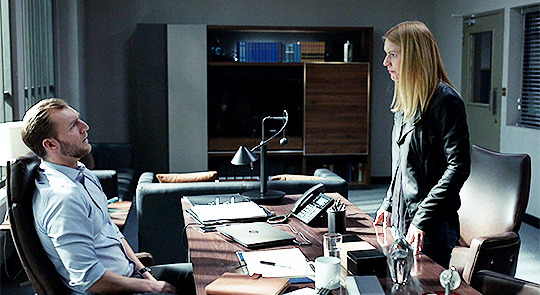
Carrie’s comment in the premiere that Mike was not an “alpha” looms large in this scene and throughout the episode. Carrie makes several comments about him finally doing the job the right way or her way. Their differing personalities and management styles are on full display visually here. Carrie towers over him, while Mike sits back, hands folded in his lap.
Also, as a logistics person, it bothers Gail that Mike has set up his desk so his back is facing the window. With all of that top secret intel on his computer, isn’t having the windows right there a problem? Is this an intentional nod to his incompetence or did the better lighting of his office for the crew win out? (Sara thinks it can be both.)
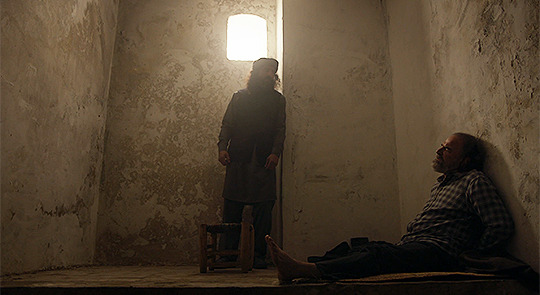
The Saul/Haqqani scenes this episode were uniformly visually stunning. First, the show continues its use of light to reinforce who knows what. Here Haqqani’s face is cloaked in darkness while light falls across Saul’s face.
Overall, Saul’s captivity plays out plot-wise obviously much differently this time than in season four. We’re struck as well by how different the mood is. Both men lean or hunch here. They’re tired, they’re old, they’ve done this before.
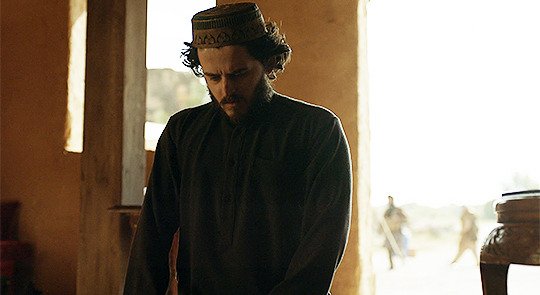
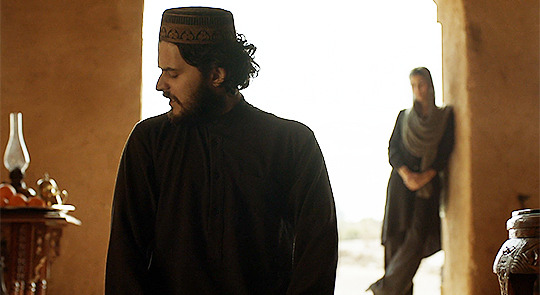
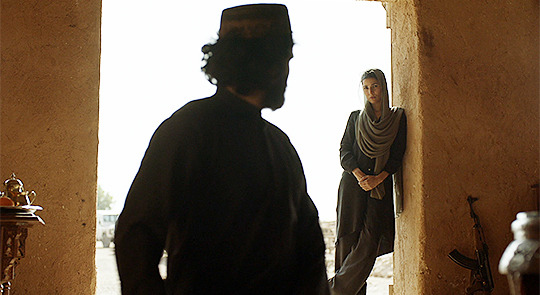
The slow pan around Jalal while he’s praying to reveal Tasneem is … *chef’s kiss* (and suggests so much her persona of being the ultimate puppet master, waiting around any corner).
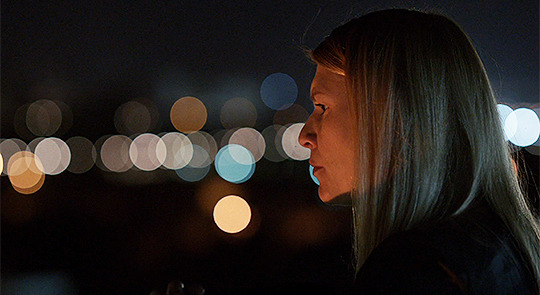
More bokeh, more smoking. Smokehing.
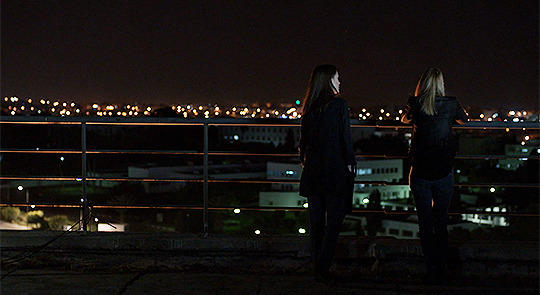
There’s more mirroring between Carrie and Jenna this week, which is probably how Jenna intends to befriend Carrie (“Carrie smokes? I should too!”), but it actually just feeds into Sara’s theory that Jenna is going to “single white female” Carrie. We love the framing here of Carrie, back to camera (and to Jenna), and Jenna lurking behind her.
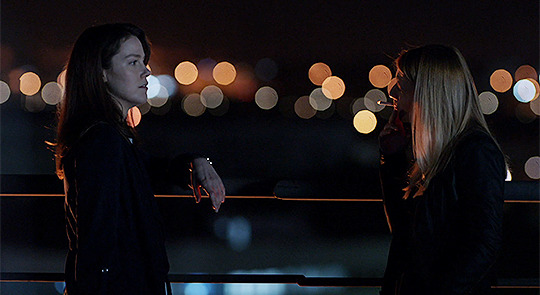
And some visual symmetry here. The camera shots of the two of them are often at a distance, speaking to the depth (or lack thereof) of their relationship. Throughout this episode we see a variety of different pairings between characters. The camera choices in these scenes illustrate closeness and proximity, or distance and mistrust.
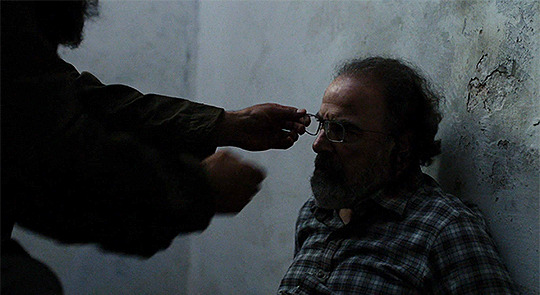
In season four there were so many references to Saul losing his eyeglasses during the prisoner exchange. If you recall, he takes them off on the tarmac and Carrie picks them up after she convinces him to get up. Later, she returns his glasses to him just as their car is hit by an RPG. So, given that, two things:
Saul losing his glasses and then getting them back is almost certainly a harbinger of shit to come!
We absolutely loved the framing of this scene: Haqqani’s hands slowly coming into frame and gingerly placing the glasses back on Saul’s face. We mentioned above how different the mood was this time around with Saul and Haqqani and this gentle act seemed to encompass all of that.
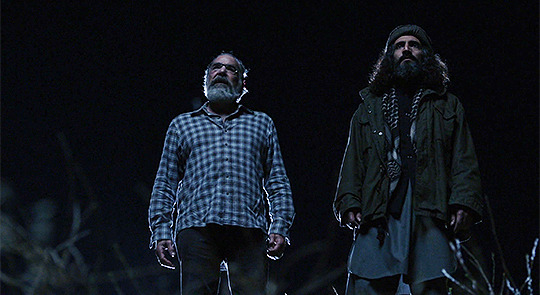
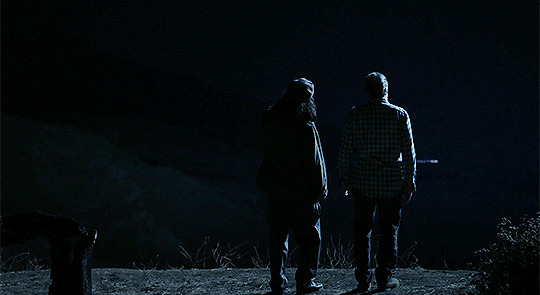
Two old men, some (we, Jalal) would say past their prime, standing alone in the dark.

And the dark gives way to a new dawn, a new day. We’re about to break out into song!
But seriously, this was a gorgeously filmed scene. We do wonder how long they were waiting out in the mountains of Morocco for the sun to rise.
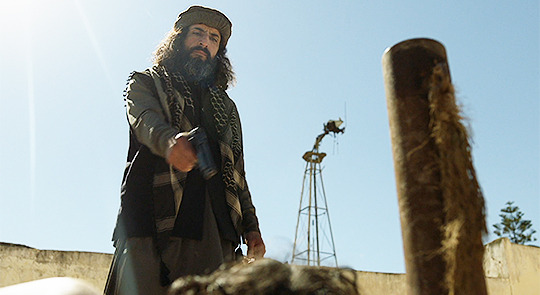
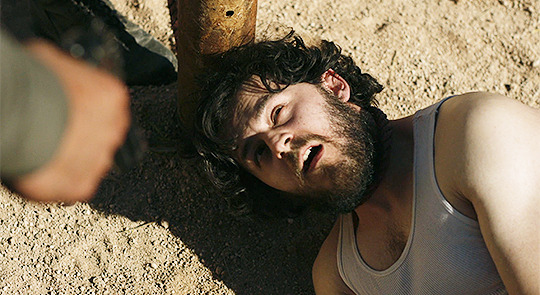
The scene between Haqqani and his son Jalal was the standout of the episode. It is such an eerie reflection of the end of “From A to B and Back Again” when Haqqani kills Aayan. That episode and its ending are at this point Homeland lore, which has the added benefit of making what was already a tense scene fucking unbearable.
We love the use of perspective and shot/reverse shot here.
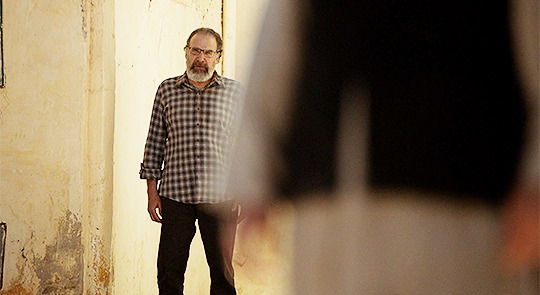
The parallels with “From A to B…” continue. Then as now, Saul looks on, helpless, wearing a similar outfit but this time with his hands unbound. Then as now, Haqqani makes a spectacle of it all, when he knows others are watching (the Americans via drone in season four, his entire crew in the courtyard now).
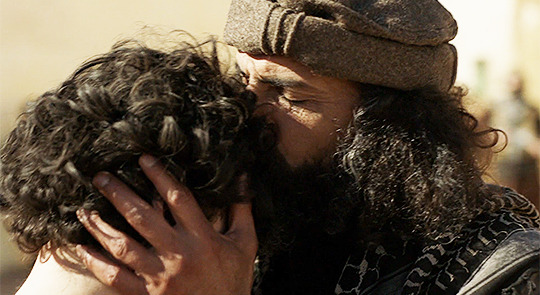
The kiss to the forehead. At this point we were about 650% sure Haqqani was about to shoot his son in the head.
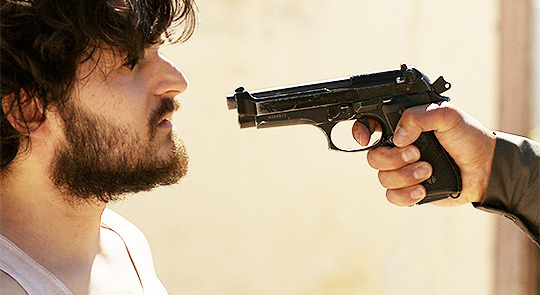
And he does pull out the gun. Jalal literally stares down the barrel.
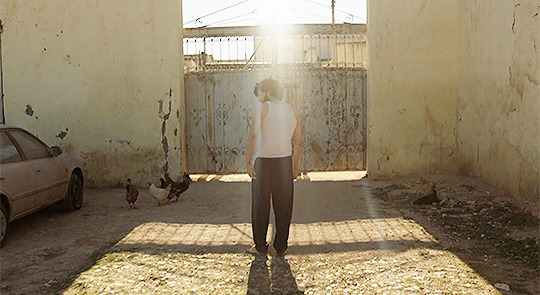
Instead of killing him, Haqqani just throws him onto the street, which is maybe just as bad if you’re Jalal. The framing here is remarkable. Jalal stands in the center of the frame, back to the camera, ensconced in sunlight. He’s not awash in some heavenly light. On the contrary, it’s almost as if he’s just been spit out of it, cast out of the kingdom. It all seemed vaguely biblical, like a reverse Prodigal Son, though we’re not sure if that fits exactly. If you know, drop us a line!
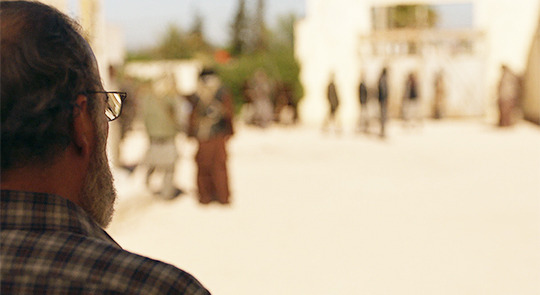
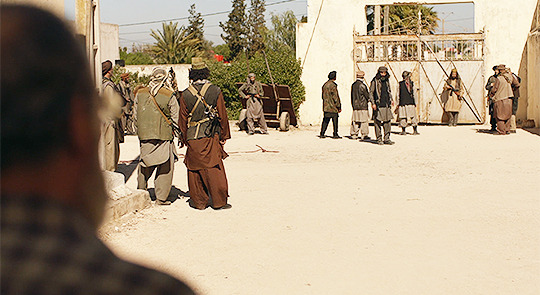
We’re three episodes into the season, and we’ve gotten an “over Saul’s shoulder” shot in each one. This is now a theme!
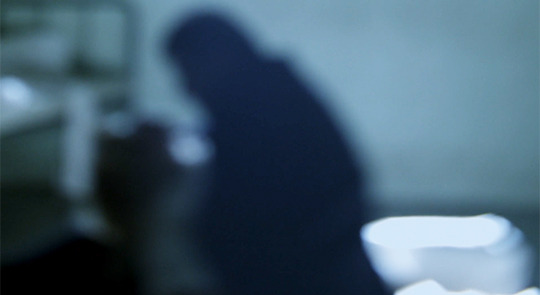
Homeland is not a show that uses flashbacks that heavily (other than the aforementioned Brody/Nazir series from season one and when they de-aged Claire Danes by putting her hair in a half ponytail). They’ve been effective thus far, slowly peeling the layer on the onion that is Carrie’s Russian captivity.
As Yevgeny recounts Carrie’s suicide attempt, we see split-second flashes in her head. At first, the images are blurry.
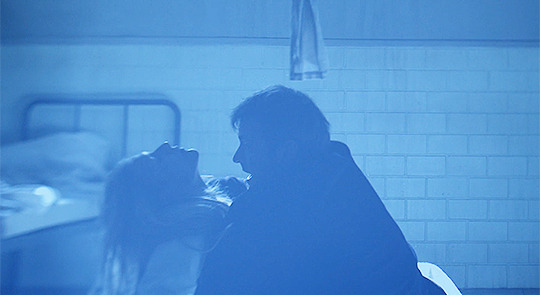
And just a few seconds later, they come into focus for us as Carrie remembers. All this is obvious enough, but we also think the way that the focus on the images shifts so suddenly and the way the sequences are edited serve to disorient the viewer in the same way Carrie remains disoriented and confused about just what happened during the seven lost months.
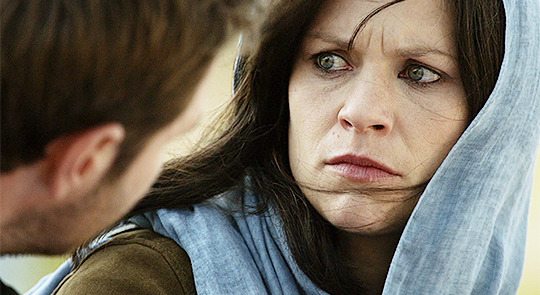
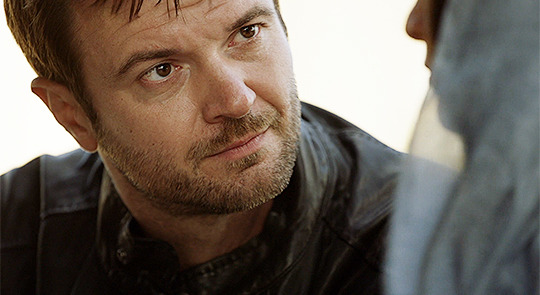
This scene is notable for a few reasons. First, Carrie and Yevgeny remain so physically close. He leans into her. We also love that it’s more than just Carrie’s reaction to what he’s saying. We see Yevgeny’s reaction to her reaction, as well as his emotions in recounting it. He is remarkably free of judgment and shows legitimate, deep caring, possibly love, as he reveals one of Carrie’s darkest moments.
And while Carrie makes an offhand remark about her relationship with Brody being accessible information in her “file,” the fact is she never talks about him. Like, ever. (Sara maintains Carrie has a mental and possibly physical “Brody box” that remains sealed.) The significance of Carrie opening up to Yevgeny about what is--sorry, folks--the love of her life really can’t be overstated.
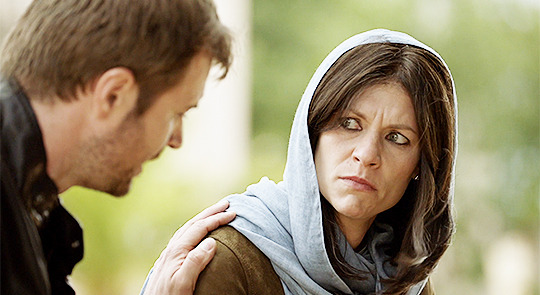
All we have to say about this is “ughhhhhhhhhh.”
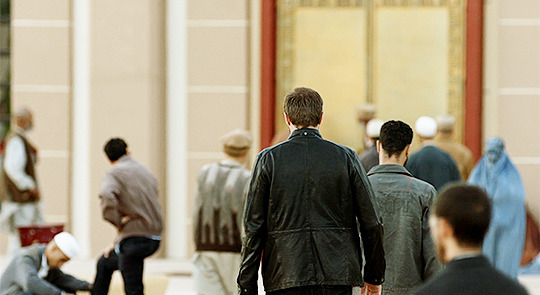
We’re three episodes into the season, and we’ve gotten a “Carrie watches Yevgeny walk away” shot in each one. This is now a theme!
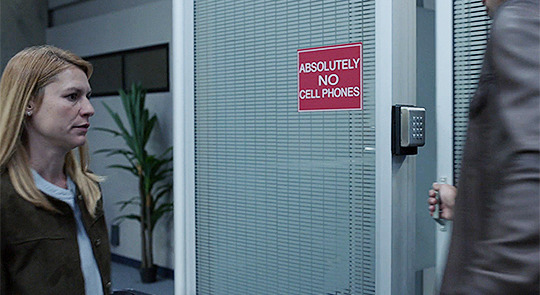
We really hope that the blaring red “ABSOLUTELY NO CELL PHONES” sign is a callback to when Brody infamously and inexplicably snuck his cell phone into the situation room in “Beirut Is Back,” allowing him to send a “DANGER! DANGER! DANGER!” text to Nazir just in the nick of time.
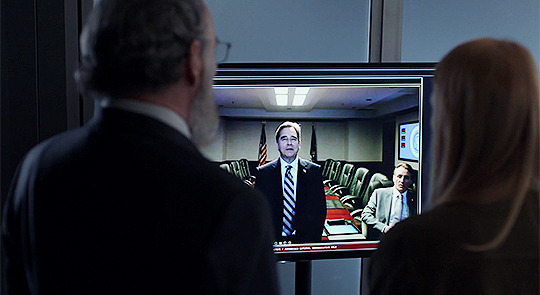
IJLTP.
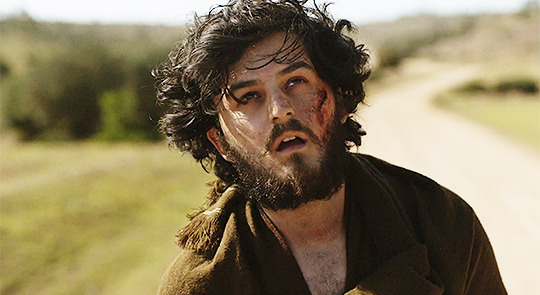
Here is our Reverse Prodigal Son: lost and wondering, his face bloodied, bordering on delirious.
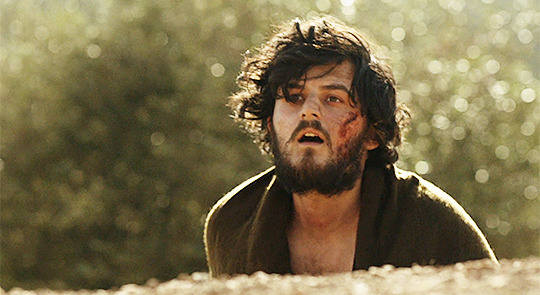
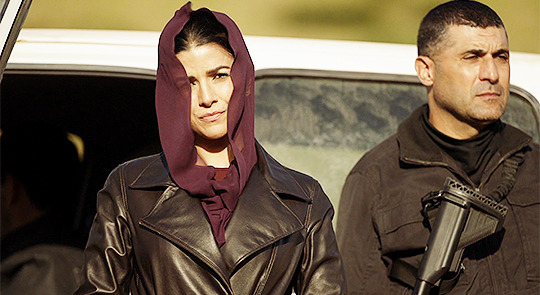
And here is Tasneem, her beautiful aubergine scarf blowing perfectly in the wind (sorry, Sara forgot to do Things Tasneem Wore This Week, but she thinks this aubergine scarf is beautiful), looking like a goddamn puppet master goddess, coming to save him. And by “save” we mean “control and manipulate.” Saviors really do come in all different flavors on this show.
#homeland#homelandedit#in the director's chair#keith gordon#peter levy#false friends#*#by: sara#by: gail
7 notes
·
View notes
Text
beyond-far-horizons
This is awesome and because *hangs head in shame* I dont play the games (i'm a noob with no money and my parents never let me have video games so I just like the story okay?) I have never seen this bit.
I ADORE multiverse/underworld stuff as you know or perhaps you don't as I don't know how far I got explaining Aeq and Midnight Palace but it is FULL of that stuff. I love the symbolism and it is very Jungian (I am the Priest of Jung okay, welcome to the New Testament of Jess!) But I need to sleep rn so we can get to it later.
Thank you for showing me because then I can reference it if I have time but I have so many other things going on right now and dunno I love fanfic and these stories but then I get down because I get virtually no response and I need that interaction to continue. It is my luck to always like dead fandoms with minor prequel characters I guess...still I do feel the fanfic has improved my writing and vice versa
I was thinking alot about hell and demons and what 'heaven' would be as I had a very detailed review on FF.net asking me all this questions, like why Sparda would long for the light if he is a demon and dunno, it always comes back to my pet theories of light and dark and the union of opposites. Sparda is so interesting because I feel he came to 'justice' on his own but probably also cemented by this mysterious priestess who he had to sacrifice. At least that is the way
the way I would go if I was developing the lore or a prequel game. It seems the most juicy option. Anyways this 'light' ties into my feelings about the transcendent, this higher power/reality urging all to grow and develop. I guess I would see demons as base and vicious aspects of reality and sources of wild and violent energy - very much as both Jung and early cultures saw them or primal gods or 'titans'.
It's also why I have a headcanon Sparda a)is fascinated by humans - they have the same struggles as him and b)he has a huge library on religions of the world, history, philosophy and science because he is still trying to discover the nature of reality just like Eva and this is what really brings them together. I wrote this line last night when Eva looks at all the books 'So you devour our souls metaphorically instead of physically now?'
I debated on making Sparda saintly, like he has already has his struggle and is now secure in himself but that isn't interesting to me plus you know our shared love of fighting with the feral nature to ultimately make the person better. Plus I kinda like the romantic angst that way like with MadaMito hehe
Okay I need to go to bed now.
Ok, prepare for huge contrived reply incoming...
First of all. What??
I hate when parents do this. I’m so sorry, I never knew about it... I really hate this.
Video games are just another media, I never understood why people would pick on that and forbid their child from having some fun. FFS.
If you want to play something some day I’ll always be there to help you installing, finding them, etc.. whatever you might need. Or even just finding anything related to games, etc.. I don’t play much these days as you know the multiple reasons but it was such an important part of my life I can barely imagine being cut out from this, even thought we always had old consoles this was very important.
About Sparda and the fic. I need to be sincere and say I’m taking so long to reply for two reasons. First because I LOVE the way you wrote Sparda but I was afraid of being too simplistic with my reply so I delved a lot on things...
But... tah-dah : I lost the huge reply I had wrote before. My note has 0 battery so its glued to the wall and it just turns off sometimes suddenly and I’m dumb and don’t save things so yeah. I kinda lost myself and got angry about that.
Anyway, I understand what you said here, especially your feelings about the fic, in many ways I can see how my fandom views reflect in the original world I’m making, and the inverse is contrary. There are many parallels. It really helps and fandom work is as worthy as original, imo, I’ve been thinking about this. Our obsession with prequels and obscure characters has a reason and that is exactly because we want to explore what is hidden behind the veil... exploring the possibilities.
Sometimes it comes to shipping speculation, and this too has a reason.
Thinking about your views on Sparda and Eva, I thought a lot on what it truly means to write or develop an obscure ship and why we are so interested in that (think about that, many of our common favorite characters from prequels, etc..)
I came to the conclusion that in Eva/Sparda just like in many of our other ships, has the common theme of the heroin facing her ‘dark reflection’, her ‘animus’ as Jung would say (OH BOY I’m entering that with you), and she, at first rejects it like she reflects her own darker aspects, her unconscious… its abhorrent for her so she seeks to destroy it as rapidly as possible as seen by Eva’s renewed determination after learning Sparda’s true nature in chapter 1. The animus represents her doubts and unconscious... However what we see in your story is much more interesting.
Most stories of this kind focus solely in the female aspect changing from her interactions with the male, who is already developed, but here we have Eva being able to re-awaken some viciousness in Sparda when it seems he has been quite restrained from quite some time (centuries) but also, something that is much more interesting.. it calls to his own determination and his own personal story and sacrifice, for some reason his ‘lust’ and brush with the dark side makes it all more important and more powerful than if he simply had been saintly at that point, like you said. It makes he revisit it all and ponder.
I love how you added lines of ‘temptation’ from Mundus, part of Sparda seeks to surrender to his ‘nature’ as its just so easy, like slip in a pair of old shoes... while the priestess memory, albeit silently, fights it and reminds him of his struggle and his ideals and ultimately her sacrifice which was also his own sacrifice (of his old ways). I think his darker side has been neglected and I think you will use this to develop Sparda into greater heights. Its great we get to see this in the actual story and he is not perfect, but he certainly is incredible.
Also, just as a side-note I loved how you described his hunger as mostly non-carnal as he glimpses her spirit and its light... when we see Sparda’s POV we get reminded every time of his non-human nature and his non-human perception of things which is clearly different. A demon’s prey is not flesh but spirit and this makes a lot of sense and a lot of potential.
To sum it up, you snatched the best of both worlds and is about to develop both characters under a relationship, as they have a lot to learn and gain from each other. I think this is the way your narrative is going, more or less.
These developments are unique aspects which I find extremely interesting and you are doing this in such a genial way and I can see already by the end of the latest chapter the strings of the themes I mentioned are pulled and ready to be followed.
So yeah, they’re in for a journey of development together. Neither of them starts the story as a ‘perfect’ entity either way... This was shown in a very nice way as you pointed out misconceptions regarding both sides involving the duo of protagonists.
“I was thinking alot about hell and demons and what 'heaven' would be as I had a very detailed review on FF.net asking me all this questions, like why Sparda would long for the light if he is a demon and dunno, it always comes back to my pet theories of light and dark and the union of opposites. Sparda is so interesting because I feel he came to 'justice' on his own but probably also cemented by this mysterious priestess who he had to sacrifice. At least that is the way I would go if I was developing the lore or a prequel game. It seems the most juicy option. Anyways this 'light' ties into my feelings about the transcendent, this higher power/reality urging all to grow and develop. I guess I would see demons as base and vicious aspects of reality and sources of wild and violent energy - very much as both Jung and early cultures saw them or primal gods or 'titans'.”
I abstained a bit from the conversation earlier as I feared my careless/godless (lmao) perception was too disturbing for you or anyone but I also pondered on concepts such as heaven and hell, salvation, damnation, etc.. when considering Sparda’s tale. I know DMC isn't Christianity but its imagery is somewhat based on Abrahamic religion/mythos so I’m bound to take in consideration some of my ideas regarding biblical mythology, as in...
When I started reading the bible so long ago it always puzzled me to imagine what exactly were angels/demons. I mean, are they even able to think in the same way as us?? Or are them more like ‘robots’, AI following orders (especially angels sometimes strikes me as that) and perhaps demons are those ‘robots’ that rebelled against their determined function, idk.
Something I wondered more than a decade ago was if demons in the bible are truly lost in every way so I started thinking within the dmc setting. I’m interested in that all and those things I mentioned. The interesting part is that I once asked that to my catechist if demons could be redeemed (lmao I was crazy, I know, but bored above all). She was at first very mad with me (she was always) but she reluctantly told me that demons had known god up close and felt his power so their sin in not following him is much bigger than a human’s, something of the sorts. So it sounded like they are also able to choose their way and I sort of apply this to dmc, lol. I’m weird, I know...
Are they capable or ‘worthy’ of forgiveness, because demons in dmc clearly have free will and thought like us, or at least similar to us. Some of them, like Sparda have clearly a lot of intellect, but like you said... others are very ‘primal’. Perhaps this is the key. The ‘evolved’ demon develops intellect and power... perhaps you are in the right track and it goes hand in hand? Does this make any sense?? The more powerful and developed they are, the more they develop ‘higher brain functions’ and star resembling a human more, idk because the lower demons in dmc are clearly more animal-like and primal while Sparda has a human-like shape and intellect.
I think I know where we are going and this looks like both angels and demons are actually a ‘reflection’ of human psyche. So, demons are the primal ancient aspects of the brain are somehow walking around hell just like that, while heaven and its inhabitants are mysterious. I really like the way you described hell and its inhabitants, it makes a lot of sense to imagine it as a part of human psyche embodied, in a way. I imagine Heaven as the exact inverse of Hell so it has its own creatures and they’re born from ‘order’ instead of chaos as stated above.
We have Bayonetta as a source of inspiration and I think its very valid to use that in order to understand Sparda. Heaven isn’t exactly good there, is it? In fact it appears like a very controlling environment.
Hell: Primal, violent, survival of the fittest anyone? Hell inhabitants embodied the most basic aspects of the brain, as you said.
Heaven: It might stem from higher planes of thinking and represent the more ‘sublime’ or ‘newer’ aspects of the evolving mammal brain.
It might make an easy choice for heaven but also such tight atmosphere is bound to become stagnant, it is no longer permitting flaws and strong emotions (thus angels look apathetic af in Bayonetta).
It might seem at first glance that heaven is good, hell is bad, however I think, if you delve into heaven you might realize the beings born there might be too ‘disembodied’ as they represent exactly those parts of human psyche which are the most sublime. Let me explain, I always felt like too much spirituality tends to make people leave behind the reality of things, it might make them lack empathy for living beings who have to commit difficult decisions on a living basis, basic survival, starvation, the struggle for life, etc..
Think about enlightenment and Bodhisattva, also the rituals of mortification which are legit scary and reminds me of this concept as only those who leave behind all that is ‘mortal’ and are detached to an extreme, can reach Nirvana. I know this has not much to do with Christianity but even in this religion we find analogous associations regarding detachment as divine and saintly. Its also harmful in a way, or am I reaching? While too much focus on the primal/carnal leads to obvious horrible things: vice and chaos; too much detachment leads to apathy.
I do think some level of detachment is necessary to reach happiness but too much of it makes people forget the reality of life and makes them not able to relate anymore to the ones around them, as the focus becomes solely spiritual it kind of deafens them to the ‘real world’ and ignore it.
This is all about reaching a balance as its is our favorite theme, too much light is bad, too much darkness is bad, etc.. or else the story would fall into itself as the reality of the three settings (heaven, hell, earth) would be rigid.
So here we have a darker aspect of heaven, imo, to balance things out.
Heaven is clearly ‘order’ and hell is ‘chaos’ so we might as well find a balance... our favorite theme as always. The fact that one being like Sparda, born amidst ultimate chaos would gaze upward in delight and desire something else doesn't surprise me. The fact is he could be bitter about it, you even gave away the line on your fic where Sparda mentions he has been denied ‘light’. I wonder what exactly that means and this is one of my favorite aspects of your Sparda is that he is aware of his condition and even thought he worked against it its still lingering to him.. like his own flickering appearance.
But he hasn’t made his way up to heaven, huh?
So its not a far reach to believe in it (that he desired ‘light’, whatever it is) but my personal belief is that too much ‘light’ is not good either and Sparda realized the beauty in flawed humanity, which sits right in the middle of light and darkness, order and chaos... that’s why he became enamored by the concept of humanity and all the struggle our own condition imposes upon us.
For me this is an archetypal theme.
Just food for thought.
The matter is... how? What exactly awakened him to justice?
This makes stuff much more interesting. This was a huge ramble, I know but I needed to develop this and see if it works,
It's also why I have a headcanon Sparda a)is fascinated by humans - they have the same struggles as him and b)he has a huge library on religions of the world, history, philosophy and science because he is still trying to discover the nature of reality just like Eva and this is what really brings them together. I wrote this line last night when Eva looks at all the books 'So you devour our souls metaphorically instead of physically now?'
So yeah, about a) I’m totally with you and I can see why Sparda would empathize with humans, as I talked earlier and I think my explanation on why Sparda would be fascinated by humans instead of ‘angels’ is made up above and I hope this doesn't sound too weird, just my line of thought.
As a demon, he’s born from a very ‘imperfect’ reality. He knows how shitty things can be... Now I really wonder how his life was before he ‘awakened to justice’ he must have witnessed some remarkably horrible things in his life..
Under the setting I mentioned, it would be I think its kinda easier for a demon to do this since angels would be too stuck up in their haven, idk so this is how Sparda, the unlikely hero is the first of these beings to take arms and defend humanity. Sparda is so special as he was the one to side with humans by his own decision and free will. What a guy!
I debated on making Sparda saintly, like he has already has his struggle and is now secure in himself but that isn't interesting to me plus you know our shared love of fighting with the feral nature to ultimately make the person better. Plus I kinda like the romantic angst that way like with MadaMito hehe
I’m glad you didn't! This is probably a gradual process even thought they say he ‘awakened to justice’ which makes it seem like he suddenly just did so I believe he had brewing feelings from his life as a demon in hell...
He must have been such an unique individual to perceive truths his peers where not ready to learn and truly, an act of rebellion against the system itself coming from someone who is ‘supposed’ to do only harm is really something we want to see on screen and I’m so glad you didn't simplify it as being a single event in his life.
I’m really in love with this theme because it shows these beings are able to change their own destinies, even someone with such dark origins.
3 notes
·
View notes
Text
SUMMARY
Thomas Dagget, a Catholic seminary student, loses his faith when he sees visions of a war between angels. Years later, Thomas is a detective with the Los Angeles Police Department. Two angels fall to Earth: Simon briefly enters Thomas’ home and warns him of coming events, while Usiel, a lieutenant of the Archangel Gabriel, is killed in an altercation with Simon. Investigating the disturbance, Thomas finds in Simon’s apartment the obituary of recently deceased Korean War veteran Colonel Arnold Hawthorne, and a thesis about angels which Thomas himself wrote in seminary. Meanwhile, in Chimney Rock, Arizona, Simon finds Hawthorne awaiting burial and sucks his soul out of his body.

The medical examiner informs Thomas that Usiel’s body has no eyes, no bones, hermaphroditism, and the blood chemistry of a fetus. His personal effects include an ancient Bible, with an expanded Book of Revelation that describes a second war in Heaven and prophecy that a “dark soul” will be found on Earth and used as a weapon.
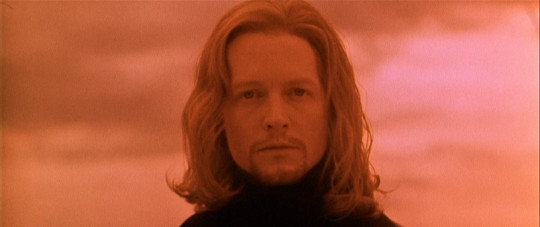
Gabriel arrives on Earth. Needing a human helper, Gabriel catches a disappointed Jerry, a suicide, in the moment of his death. Jerry retrieves Usiel’s belongings from the police station while Gabriel destroys Usiel’s body in the morgue. Finding Hawthorne’s obituary, Gabriel and Jerry head for Chimney Rock. Before Gabriel arrives, at the local reservation school Simon hides Hawthorne’s soul in a little Native American girl, Mary, who immediately falls ill and is cared for by her teacher, Katherine.

After finding Usiel’s burnt body, Thomas hurries to Chimney Rock. When Gabriel realizes Hawthorne’s soul is missing, he confronts Simon. Hawthorne’s soul will tip the balance to whichever side possesses it, and a win for the rebellious angels would make Heaven like Hell with Earth in its thrall. Gabriel tortures Simon, but he refuses to reveal its location, so Gabriel kills him. Mary shows signs of possession by Hawthorne, recounting an incident from Hawthorne’s harrowing war experiences in first-person perspective. Meanwhile, Thomas examines Simon’s remains and questions Katherine. In Hawthorne’s home, he finds evidence of war crimes. Thomas visits a church to reflect in and is shaken by a verbal confrontation with Gabriel.
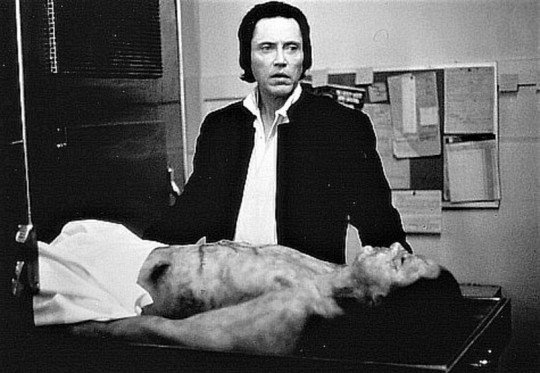
At school, Katherine finds Gabriel questioning the children. After he leaves, she rushes to Mary’s home and finds Thomas. As Mary’s condition worsens, Katherine takes Thomas to an abandoned mine where she had seen Gabriel. They find angelic script and experience together a terrible vision of the angelic war. Returning to Mary, they find Gabriel and Jerry. Thomas kills Jerry, while Katherine distracts Gabriel when her wild gunshot misses him and blows up Mary’s trailer home. They take Mary to a Native American site to be exorcised. In a hospital, Gabriel recruits a new unwilling assistant, Rachael, just as she dies of a terminal illness.
Lucifer confronts Katherine and tells her that “other angels” have taken up this war against mankind, and since then, no human souls have been able to enter Heaven. He knows Gabriel plans to use Hawthorne’s soul to overthrow the obedient angels. He also knows that if Gabriel wins the war under his influence Heaven will ultimately devolve into another Hell, which Lucifer considers “one Hell too many”. Lucifer then appears to Thomas and advises him to use Gabriel’s lack of faith against him. When Gabriel arrives and attempts to disrupt the exorcism ritual, Thomas kills Rachael, and he and Katherine fight Gabriel. Gabriel defeats them and moves to kill Katherine.
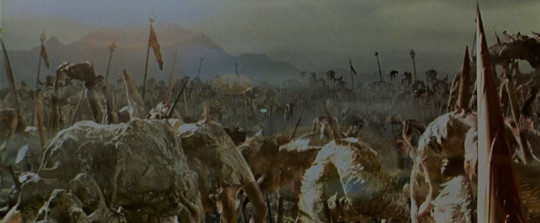
Lucifer appears, encouraging the Natives to complete the exorcism. Lucifer confronts Gabriel, telling him that his war is based upon arrogance, which is evil, making it Lucifer’s territory. Lucifer tells Gabriel he needs to go home and rips out his heart. Simultaneously Mary expels out Hawthorne’s soul. The “enemy ghost” starts to attack Thomas and Katherine, but a bright light from Heaven appears and destroys it. Lucifer asks Thomas and Katherine to “come home” with him, but they refuse. Lucifer drags Gabriel to Hell. As morning comes, Thomas comments on the nature of faith and what it means to truly be human
DEVELOPMENT/PRODUCTION
The film was shot in fall 1993. with an $8 million budget and a solid cast including Walken, Eric Stoltz and Virginia Madsen. While strange, unexplained phenomena seemed to plague the film, it was eventually finished with only a few “act of God instances and very little fundamentalist group opposition.
“I wouldn’t be surprised if we ran into some problems later.” Soisson admits. “There are so many different sects of Christianity, not to mention Islam and Judaism, and they all hold angels in different regards. The Old Testament and New Testament are completely different; the New Testament barely speaks of angels. So Christians who look to the New Testament are probably going to find the film problematic. Then again, the Old Testament describes angels as savage beings. They seek vengeance and cause bloodshed, and that’s the kind of angel we’re describing here to a certain extent. If you look at it honestly, there is a truth in the movie.
Gregory Widen
According to Widen, who wrote as well as directed, the film sprang from his fascination with the idea of what makes an angel go bad, prompted by reading Milton and studying the Bible. “I was interested in exploring that and did a lot of research with the Bible,” said Widen. I try to back up the movie as much as I can with the Bible. I’ve got a very unusual take on angels, the idea that they’re sort of God’s hitmen. If you read the Bible, they spent an awful lot of time killing first borns and turning cities to salt, especially in the Old Testament, and so the idea was to really play up that aspect of their personality.
“I thought we’d lost in our modern age the feeling that angels are anything but these fluffy things on your shoulder. There was an earlier time, a few hundred years ago, when they were seen in a much more complicated way, as creatures that were fearsome in some ways. They have free will, they’re not just an extension of God, because they obviously can rebel: they did it once before. They’re just fascinating to me as a creature, the ability to praise God all day, but with one wing dipped in blood. You’re doing God’s dirty work all the time, and you have free will, so what kind of personality does that create in a creature?”
Since the film relies heavily on historical and literary influences, many audience members unfamiliar with angelic lore might be turned off. Widen disagreed, countering, “I don’t think so. A lot of the stuff is mainly textural and will help your enjoyment of the film. And if you don’t get every single Biblical detail, I don’t think it gets in the way. If you do (get it), it’s just an added benefit.”
The film’s interpretation of angels isn’t the only potentially controversial viewpoint. While God and Jesus are mentioned, Lucifer plays a significant role at film’s end.
“Lucifer actually makes an appearance in almost a Lecterian sort of way,” said Widen, “because his basic position is that two Hells is one Hell too many. Gabriel is, in many ways, taking Lucifer’s route, from a Milton point of view.
“Unfortunately now we tend to push these things into all evil and all bad, and the Devil is just this cackling guy in a corner who was evil from moment one. Actually in the Bible and a lot of other writings, Lucifer started out as the good guy. He was the best angel, and along the way he began seeing things in a way that became incompatible with staying with God. And it was almost a heartbreaking falling out. Gabriel is doing the same thing in many ways, where he doesn’t think he’s doing anything wrong. He thinks he’s right and everybody else is wrong. He doesn’t want to be a king, he doesn’t want to rule in Heaven, he’s not trying to overthrow God. He just thinks there’s a fundamental wrong going on and everyone just sees it wrong.
“Ultimately that’s how Lucifer fell, too. He wasn’t really trying to undo God, he just disagreed. Lucifer’s a much more tragic figure in this movie. He’s more like a guy who lost the love of his life and is still a really bad guy, but is still kind of a sorrowful guy, too. But he’s there to help the humans because it’s simply not in his interests for Gabriel to win.”
The story also juxtaposes Christian mythology with aspects of Navajo mysticism. With the final battle staged on a Navajo reservation, the question of how two seemingly disparate beliefs can coexist is raised. “They weave pretty tightly,” explained Widen. “The idea is that the girl’s possessed, and the Navajo culture does have a procedure for depossessing someone. And they carry on as if that’s the issue and the two worlds meld climatically at the end, where you have an Indian exorcism and you also have Christian-based humans desperately trying to stop these angels. The idea is that they all complement each other; they’re not necessarily in opposition to each other as two concepts.
“For example, there’s a line in the movie where one guy turns to the Indian and says, “You know, this may not be a Navajo ghost,’ and the Indian says, ‘It’s all the same.’ That’s the idea. As far as they’re concerned, this is just a negative spirit inhabiting a girl.”
In eerie fashion, the production had its own run in with evil spirits while filming in Arizona. On the day filming was to occur on an Indian village set, Jones Benally, a medicine man employed as a stunt man, warned producers that two bad omens—the sighting of a coyote and an owl—had occurred and he had misgivings about continuing the production. A storm, with 120 miles-per-hour winds and lightning, subsequently blew in, destroying the set.
“We had built an Indian village on a cliff, and it blew away one night,” remembered Widen. “We had a hellacious storm. It was foretold by a medicine man because we had accidentally killed an owl with one of our trucks.”
Despite the bad omen-induced weather, the two-month production went smoothly. “I had a great time,” said Widen, who makes his feature directorial debut. “I had really great actors, which is half your job. If you have great actors, the most important thing is to just get out of the way. I definitely had Christopher Walken in mind (when I wrote this). He was the first one that signed on. Walken is an incredibly gifted actor. He gives you exactly what you want. And he has a certain ethereal quality about him that really works well with this—that otherworldly quality helps you believe he’s not quite of here. I thought that worked enormously well for him.”
The ultimate script was shaped by the concept of the seraph God’s highest order of warrior angels. Widen then centered on one particular angel, Gabriel (Christopher Walken), who wants to overthrow heaven but needs to come to Earth to snatch the black soul of a recently deceased general, which will help him strategically to win the fight.
“This was definitely a tough movie to pitch,” notes Soisson. “It’s a profound concept that makes people go ‘hmmmm,’ and they’re usually blown away when they read the script. It’s different and thought-provoking and scary, and we hope the movie will capture that. It’s one of those lucky breaks, where you’re actually trying to do justice to the script instead of trying to get a script that does justice to the production.”
Selling a studio on the idea was the hard part. After shopping it around, with Widen as a first-time director, all the team received were unnecessary criticisms one executive thought the movie was great, but didn’t understand why they needed to have the angels in it, so Widen went the independent route and ended up with an $8-million budget and considerable creative freedom. “For the film to work, it had to be done on its own terms, and I think it will work on its own terms,” Widen says. “I was afraid the studios would rub off the edges.”

Interview with Virginia Madsen
You worked with another great actor, Christopher Walken, in The Prophecy.
Virginia Madsen: Yeah, and you know, Gabriel also has a broken heart. He feels he’s been cast out by a God he deeply loves. He’s terribly jealous of humans; he feels they have replaced angels, and so Chris played that with a lot of deep, deep pain and betrayal.
He’s such an eccentric performer; what was it like acting opposite him?
Virginia Madsen: Well, fortunately, I had met him prior to the Prophecy, because we were going to do another film together that never got made. So I already knew him as this wonderful, sweet, quiet man, and suddenly he showed up with this demonic, unholy white skin and black, black hair And he was constantly eating raw garlic! To me he was normal, because I already knew him, but everyone else was scared and repulsed because of the garlic, and I know he was doing that on purpose so people would feel that way.
So he was more Method than Todd…
Virginia Madsen: Yes, but I was like, “You know, somebody has to say something.” So I said, “Chris, man, what’s with the garlic?” And he replied, “Well, Virginia, I’ve done a lot of naughty things…” “Oh, it’s a health thing?” I was like, “Yeah, sure it is.” And I said, “Well, Chris, what if we were playing a love scene between the two of us?” He said, “Well, in that case, Virginia, I would abstain.” “OK, thank you!”
You had a great cast all around in The Prophecy – Elias Koteas, Eric Stoltz, Amanda Plummer, Viggo Mortensen. It must have been very interesting to work with them all.
Virginia Madsen: Well, it was not a good experience. I mean, it wasn’t terrible, because I love my job and those guys were great, but we didn’t have much of a script. They were constantly trying to write it as we went along, and that’s terrible for actors, because all we have is the lines to say. So that was awkward, and we were trying to make it better, trying to make things make sense. We were acting our hearts out, you know what I mean? It was like, “Well, that makes no sense, but I’m gonna say it anyway! And I’m going to say it with great conviction.” We kind of felt we were treading water all the time, and Viggo came in just for a day and wrote that scene.
Lucifer’s whole “We’re open every day, even on Christmas” speech?
Virginia Madsen: Yeah; I don’t know how much he worked with the writer/director, but it was my sense that those were his words, and they were so beautiful. That was one of the extraordinary nights, because I had never met Viggo, nobody knew who he was and his work was amazing. And then Eric Stoltz came in, and he was very poetic, and everyone was intrigued by the idea of angels feeling they were not God’s favorite anymore, and how they were jealous of us because humans have souls. There was all this Biblical stuff we were discussing and trying to bring into the story, and everybody cared a lot about it.
It was also very creepy a lot of the time. There was a lot of night shooting, and the subject matter was very dark, so that feeling prevailed every day, and it kept getting darker and darker and darker. The one ray of light was Adam Goldberg, because he was so funny! I found it difficult to stay in character around him, because he was so hilarious.
Then there was a terrible storm while we were shooting up on the mesa, with the actual Native American tribe from the area we were shooting. This strange pink cloud that resembled a fist, I kid you not, came down out of the blue sky, and it looked like a big finger pointing—the finger of God-and the Native Americans left. They were like, “This is bad. You have bad mojo on the set. We can’t help you, and we’re leaving.” The director was like, “You can’t leave! We’re filming!” And they were like, “That’s a sign from God,” and they took off!
Very quickly, like it was out of hell, this massive windstorm rolled in and just blew our entire village off the top of the mountain. The trailers were blowing over, and the police were up there with a big truck trying to get us out, and then I saw this figure striding toward me it was Christopher in the wind! Trees, tumbleweeds, everything was blowing around him, and he looked so scary. I was like, “C’mon!” He was yelling something, and at first I couldn’t hear him because the wind was gale-force. And all of a sudden I realized he was saying, “Why aren’t we filming?” “Because, Chris, you’re gonna blow off the mountain! Get in the truck!” It was really scary, but he thought it was great. And you know, he was probably right. Somebody should have grabbed a camera and shot that!
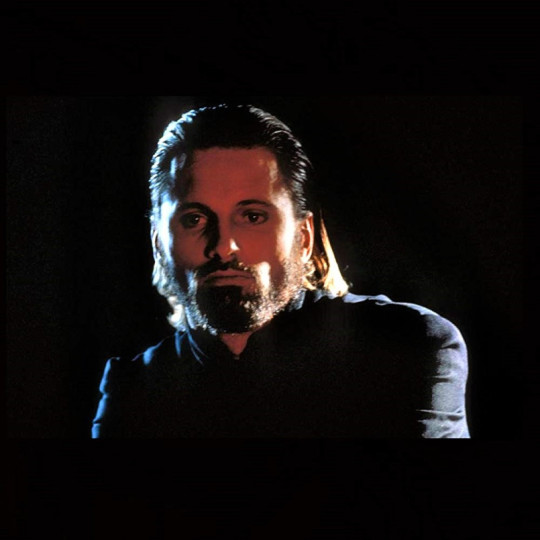
Without question, the only person who could pull off the strikingly dangerous yet sympathetic qualities of Gabriel is Walken, who was also the first to sign onto the film and whose interest was integral to getting such a comfortable budget for an independent movie by a first-time director. Naturally, of the entire crew, Walken has been the only person not affected by the rumors about Queen of Angels’ ninth floor.
“Walken ended up taking off by himself to go up there,” recalls Scott Patton, whose Patton FX (consisting of Dave Snyder, Mark Maitre, Bernhard Eichholz, Walter Phelan, Susan Lamson and Mark Villalobos) provided the special makeup FX. “He said, ‘I’ll be back, I’m going to see a ghost.’ Everyone else was freaking out, because it was 4 a.m. and he was going up there alone. Eventually he came back down and kind of chuckled to himself. Who knows what he saw? He could have seen every demon in hell running down also appears as an impaled angel in one of the movie’s visions, who has the horrible disposition one would expect from the assistant of Lucifer (Viggo Mortensen)himself.
“Being Satan’s sidekick would not be the most desirable position to have in the afterlife,” says Patton. “This character basically has no eyes and a crown of thorns on his face. It’s supposed to be a mockery of Christ wearing that crown and a symbol of blind faith, and blind faith to Satan would be a horrifying thing anyway.”

It was a movie we originally budgeted at $10 million, and we wound up with about $3 million to make it, so we had to perform a bit of triage to make it work, get everything we needed and not go over budget. I totally enjoyed Walken. He’s such a professional that when he had a couple of meltdowns on the set, because of things not being done right—which was somewhat budget-induced-each time he would very congenially ask me to walk with him around behind the trailers, just to have a little chat. Then, as soon as we were out of earshot, he would totally rip my throat out, and then say something like, “Do you understand what I’m saying?” I would say, “Yeah,” and then we would walk back and he was totally cool. Nobody ever knew I was completely shamed by him. I respect that, and I would work with him again in a heartbeat. – Joel Soisson
According to Patton, character makeups have been the effect of choice on Prophecy; among this work contributed by Patton’s crew and his key on-set prosthetic supervisor Dave Snyder are appliances for Walken and Eric Stoltz, who plays the benevolent angel Simon. However, Goldberg had the most work done on him, since he gradually decomposes throughout the course of the film.
“Adam used the makeup in ways more actors should, in the sense of using it to get into character,” says Snyder. “He would take whatever minimal discomfort there was from the makeup and totally buy into that, and blow it so out of proportion that it would be hilarious.”
“He would never ever bitch and moan to us,” Patton adds. “He would say, ‘I hate you,’ and we’d say, ‘Good, we’re making it hurt as much as we can.’ And for some reason, that would make him feel better he’d revel in the fact that he was being put through as much pain as possible.”
Neurotic and terribly funny, Goldberg, who does an eerily dead on Walken impersonation agrees that the process was a nightmare but couldn’t help but use it to his advantage. “It really helped me become the character, because I would never have had any sense how to play this guy until I put the makeup on,” the young actor says. “There’s something about looking at yourself in the mirror all made up, and actually feeling the stuff on you, that makes it quite easy to put yourself in the shoes of somebody who is decomposing.”
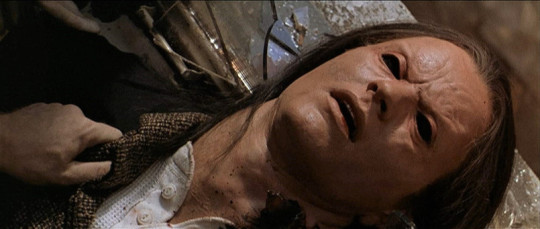
Dealing with religious iconography is always a touchy subject, and retain the film he order for secure. While there were many studio offers, the producer held out for independent financing in order for Widen to direct the film himself and also to retain the story’s impact.
“I had to walk a lot of miles, but Robbie Little of Overseas Filmgroup has been extremely supportive,” says Soisson. “He looked at it and said, ‘I love it, but I’m scared of it. I want to help you guys, but it’s going to take a while, and it did. It took almost two years, but he hung on with us. sold off some territories and gambled his own money. We cobbled together the budget and ran with it. I’m sure that if a studio had done it, we would not have been involved. It would have been made for $40 million and I’m sure they would have had some compensating values, but I’m obviously glad they didn’t make it.”
SOUNDTRACK/SCORE
The Prophecy (1995) David Williams
youtube
CAST/CREW
Directed
Gregory Widen
Produced
Joel Soisson
Written
Gregory Widen
Scott Patton … special makeup effects: Patton EFX
Martha Preciado … key makeup artist (as Martha Cecilia)
Dave Snyder … on-set prosthetics supervisor
Mark Villalobos … special makeup effects artist
Stephen Weber second makeup artist
Christopher Walken as Gabriel
Elias Koteas as Thomas Dagget
Virginia Madsen as Katherine
Eric Stoltz as Simon
Viggo Mortensen as Lucifer
Amanda Plummer as Rachael
Moriah Shining Dove Snyder as Mary
Adam Goldberg as Jerry
Steve Hytner as Joseph
J.C. Quinn as Burrows
Jeff Cadiente as Usiel
Patrick McAllister as Col. Hawthorne
Albert Nelson
CREDITS/REFERENCES/SOURCES/BIBLIOGRAPHY
Cinefantastique#27n02
Fangoria#142
Fangoria#335
Fangoria#136
The Prophecy (1995) Retrospective SUMMARY Thomas Dagget, a Catholic seminary student, loses his faith when he sees visions of a war between angels.
0 notes
Text
Journeys in Paganistan (Part 2)

Photo by Dan Farrell on Unsplash
Editor’s Note: As Carl pointed out last week in Journeys in Paganistan (Part 1), Occult themes abound in children’s literature, on television shows, and in the movies. The entertainment industry has made a handsome profit in selling the supernatural. In part 2, Carl Teichrib further exposes the reality beyond books and TV screens – a spiritual worldview that honors creation over the Creator and the dawning of a new Pagan age dawning. He begins with Satanism: Satanism 101: Previously, the neo-Pagan community had distanced itself from modern Satanism, a fact acknowledged in this workshop. However, an increasing acceptance of what is known as the Left Hand Path is now perceptible. To help Pagans better understand the movement and its implications, this session – led by the Satanist who hosted the Blasphemy workshop – broadly outlined philosophies, branches, and influences. Distinctions between Satanism and Luciferianism were explained. Both elevate the Self or “I” as the Self-god, but the first is more attuned to carnality and individual license, while the second pursues enlightenment through knowledge. Both are grounded in rebellion as an act of transformation. What troubled me was what I heard in the minutes before the start of the workshop. As the room was filling up, a few Witches and Satanists were freely talking about Christian reactions; how insults and hurtful words had been hurled at them, and in one case, a proclaimed Christian had picked up a bag of garbage from a nearby trash-can and dumped it on the person. Now, I have no way of verifying the legitimacy of the perpetrator’s faith – whether they were Christian in name only, or otherwise – but it made my blood boil. We as Christian believers are commanded to “love the Lord your God with all your heart, with all your soul, and with all your mind,” and to “love your neighbor as yourself” (Matthew 22:37,39). Thankfully, I do know Christians who purposely reach out to the Pagan community with grace and truth, showing love and compassion, without fear or compromise – recognizing that humanity has intrinsic value because of our special creation in the image of God (Genesis 1:26). Doc Murphy’s Plenary Practice: Of the workshops and lectures attended, I was especially interested in hearing Murphy Pizza, a cultural anthropologist who specializes in Paganistan as a religious community. Pizza had been tasked with delivering a plenary talk to the Upper Midwest Section of the American Academy of Religion/Society of Biblical Literature, and so this was an opportunity to test and flesh-out her presentation. Pizza, an academic and Pagan graced with a witty style, offered insights into changes and challenges; the contemporary social acceptance of Paganism, the struggle over who represents the community, and how a diversity of practices and beliefs are building on each other. Paganism, she noted, was no longer in the shadows. As a matter of fact, one of the reasons for its phenomenal growth is that the movement has stepped out of the broom-closet, so to speak. In the not too distant past, the neo-Pagan community guarded itself with secrecy and veils of mystery. But times have changed, boundaries have blurred, and there is openness for others to enter – and they are. Marriage of Heaven and Hell: Paganicon was more than just workshops and discussion groups. Over thirty vendors were selling books, crystals, magic wands, ceremonial knives, Tarot cards and other divination tools. A long table near the hotel’s front desk offered free literature for everyone; brochures from Druid orders, a flyer from a coven seeking new members, and postcards announcing likeminded events – the upcoming Pagan Spirit Gathering in Ohio, a Sacred Fire Circle in Wisconsin, North Dakota’s Grand Sabbat, and the Midwest Witches Conference in Cedar Rapids, Iowa. Two rooms were set-aside as art galleries. A meditation space was available for those who found themselves overwhelmed, and another room offered six stations for Tarot and Bone readers, psychics, and Reiki energy healers. Saturday evening a colorful labyrinth was set up for mystical encounters. And on the second floor, past the main ritual room, was an area for children with Pagan-appropriate activities. By the way, most children born into Pagan households stay in the community. Hospitality suites were open for specific tribes, covens, and occult orders. Llewellyn Worldwide, the largest independent Pagan/Occult publisher, facilitated meetings for writers. Throughout the hotel people were connecting and networking. At one point, a middle-aged gentleman approached me in conversation. He was involved in the New Thought movement, and was attending to better understand Witchcraft as his workplace – a health care facility – had Wiccans as staff members. I was upfront about my Christianity, and for two hours we had a deep and respectful discussion comparing the Biblical and Pagan worldviews, beginning with God as other than creation. I’m glad to have attended for this reason alone. Friday evening featuring the notable Druid, Damh the Bard, singing songs and telling stories from the old country. An Equinox Ball was held on Saturday night, a colorful celebration with vibrant costumes and a lively concert. At one point, some impromptu performances popped up in an area adjacent to the hotel lobby. Yes, the Pagan community has its own musical spread. Rituals were also part of the daily agenda, often happening concurrently with the scheduled workshops. Some were participatory in that attendees were incorporated into the movement, other times a workshop started with a small ritual – such as a libation before a lecture on animal sacrifices – and a few were demonstration rituals open for observation. All were serious in intent and action. On Saturday I witnessed the Marriage of Heaven and Hell, described as “a unique double-ritual, led by two practicing ritual magicians, in which the celestial and infernal conjoin.” In the ritual room were two magic circles on the floor, one ringed with the names of angelic hosts, and the other dedicated to the dark powers. Commanding the first was a “Christian magician” wearing Templar-style robes, equipped with a sword. His ritual followed a medieval-period, heretical text of ceremonial magic, then used by dissident Catholic priests and later by Protestant mystics. In this text, the names of God are used as a force for summoning spirits, thus “Alpha-Omega” was inscribed in the encirclement. To be clear, this was not Christian in any Biblical sense, and the participant was a Pagan practitioner versed in occult lore. In the second circle, wearing only black pants and boots, was a Satanist with ritual body modifications. His movement was a modern adaptation of another text of ceremonial magic, though of a later period and with a darker emphasis. Within his space were goblets, a knife, a goat skull, and other ceremonial tools. Bloodletting and blood drinking were part of the process, as was a verbalized and written pact with the “demon king of endarkened light, power of the Black Sun.” Both occultists – the Satanist and Christian mystic – performed within an interlocking expression, going back-and-forth to create a unified ritual. And that was the point. What appeared to be paradoxical and divergent was mysteriously bound together; two paths in one accord. But this actually makes sense. The Christian mystic was using God’s name as a universal force, a tool of cosmic power. In fact, after the ritual was over, he described his circle-center with its Alpha-Omega as the cosmic source of all things. Thus, when stepping in, he was “taking the position of God… so I command as God.” The Satanist also described his experience in a cosmic fashion; it was an act of self-directed salvation, using the demonic as a force for personal transformation. Both embody the spirit of Romans 1:25 – worshiping the creature rather than the Creator. For myself, the summation of Paganicon and the religious movement it reflects was observed late Sunday afternoon. The last workshop was over, and I had a few minutes to wander before the closing ceremony commenced. Walking into what had been the ballroom the night before, I could see ten Witches in a tight circle, repeating a simple song of theological potency. Any Christian who knows Scripture would recognize the words: “Oh oh oh… I AM that I AM.” “I’m not afraid of Witches” As a researcher, going to events like Paganicon provides important insights into our rapidly changing culture. The observations, pages of notes, and materials gleaned will be used in my presentations and teaching opportunities, informing the Christian community as to the growth and worldview of Paganism. But it doesn’t end there. Christian reactions betray an underlying condition that needs to be addressed. Upon hearing I’ve attended events like this, the response from many Christians is: “I could never go there.” Generally speaking, I agree. This type of research is not for everyone, and to go means you understand the calling and reason. However, something else is usually going on, as the statement is often followed by a question: “Weren’t you afraid?” “Are you afraid of Pagans?” I’ve asked back, and in most cases the person affirms that there is, indeed, a measure of fear. Why? Pagans are people, and odds are you interact with them without realizing it; they can be found in almost every occupation – schoolteachers, lawyers, store clerks, business owners, and students. Nor are they geographically limited. Are our fears reasonable? Or have we succumbed to stereotypes and media images, scaring ourselves? Please understand, I am not detracting from the seriousness of the spiritual reality, but if you had lived in Rome or Athens or Ephesus during the time of Christ, your Pagan setting would be far more real and raw. Yet, it was in this spiritual context that the Early Church flourished, brining the light of the Gospel forward. Moreover, the Apostle Paul even presents us with models on how to engage, pointing to the God who is creator over creation (Acts 14:11-18, 17:16-34). One week after my return from Paganicon, I had the privilege of talking with a young friend at Millar College of the Bible. She was interested in hearing about my trip, but as I explained what transpired, including the rituals, it was evident this was troubling to her. I stopped, briefly outlining the core differences between the God of the Bible and the Pagan worldview – that the God of Scripture is not compared to nature, or human wisdom, nor the strength of nations (Isaiah 40:12-18). She knew this, but it was important to re-focus on whom it is we follow. I told her something else, a fact that came to my mind when observing the Marriage of Heaven and Hell, for there was a point in which I was uncomfortable. In that place where demonic entities were being summoned, I, too, was strongly reminded of an incredible promise, “…that at the name of Jesus every knee should bow, of those in heaven, and of those on earth, and of those under the earth, and that every tongue should confess that Jesus Christ is Lord, to the glory of God the Father” (Philippians 2:10-11). We either bow in love and thanksgiving now, or judgment later. But every knee will bow – every human, every spirit. So why are we afraid? Why do we allow fear of the Pagan world to impede us? Two months later my friend excitedly emailed me. She was a cabin leader in a Bible camp, and a 12-year old had approached her: “I’m a Witch, but you don’t have to be afraid of me.” My friend told the camper that no, she wasn’t afraid of her. The next day the conversation repeated. Looking into her eyes, my friend responded with confidence, “I’m not afraid of Witches.” And with that, a floodgate of questions opened – and a Christian camp leader, a Wiccan, and a group of young ladies spent time seriously considering the God who is above all things, “For by Him all things were created that are in heaven and that are on earth, visible and invisible, whether thrones or dominions or principalities or powers. All things were created through Him and for Him” (Colossians 1:16). As our culture increasingly accepts a Pagan worldview, the question hangs over us as believers in Jesus Christ: Why are we afraid?Ω

Carl Teichrib is a researcher, writer, and lecturer focusing on the paradigm shift sweeping the Western world, including the challenges and opportunities faced by Christians. Over the years he has attended a range of internationally significant political, religious, and social events in his quest to understand the historical and contemporary forces of transformation – including the Parliament of the Worlds Religions, Burning Man, and the United Nations Millennium Forum. Since the mid-1990s, Carl’s research has been utilized by numerous authors, media hosts and documentary producers, pastors, professors and students, and interested lay people. From 2007 until the end of 2015, he edited a monthly web-based magazine, Forcing Change, documenting and detailing the worldview revolution underway – points of pressure, forces of change.

Available Online
He frequently speaks to church groups, in conference settings, and occasionally teaches a modular course on Secular/Pagan Trends at Millar College of the Bible.
Carl’s book, Game of Gods: The Temple of Man in the Age of Re-Enchantment, was released in October 2018. You can find him online at: Game of Gods: The Temple of Man in the Age of Re-Enchantment
© 2020, Midwest Christian Outreach, Inc All rights reserved. Excerpts and links may be used if full and clear credit is given with specific direction to the original content.
Read the full article
0 notes
Text
Book Review: Handle with Care

I did not grow up with a Biblical understanding of touch. When I married my wife, Jess, I better understood how we could have different thoughts and ideas. But I still did not have a Biblical basis for our beliefs. In Handle with Care, author Lore Ferguson Wilbert shares how Jesus redeems the power of touch in life and ministry.
About the Author
Wilbert is a writer who has been published by Christianity Today, Fathom Magazine, LifeWay Leaders, LifeWay Voices, The Gospel Coalition, Revive Our Hearts, The Ethics & Religious Liberty Commission, and more. She writes on spiritual formation, faith, culture, and theology in life. In this book, she writes on an important topic for our time.
Growing up as the only girl in a family with eight children, Wilbert writes with a unique perspective. In the very first chapter, she reveals that she was sexually abused. She had her first kiss at the age of 13. She was single for 34 years and is now married. She is a wife but not a mother of living children. And with all of the life she has lived, she hopes to teach us to touch well.
The Power of Touch
Wilbert takes ten chapters to tell stories, think Biblically, and take us to Jesus. She shares that the categories of touch are platonic touch, sexual touch, and professional touch. These types of touch can be given, received, taken sinfully, and subsequently received. A familiar background of love languages and purity culture is brought up and put to the test of Scripture.
The chapters that stood out to me the most were the ones that were unexpected. For instance, Wilbert makes a compelling case for the need for singles to experience touch. Also, she clarifies how dating couples can work toward the future they know, not just the future they want. Interestingly, she says that the Bible is silent on the issue of self-pleasure, so she finds it helpful to think about prolonged singleness or times of celibacy as seasons of sexual fasting.
Life and Ministry
The book ends with four reminders: (1) Remember you have a body, (2) remember you are part of a body, (3) remember your future body, and (4) remember Christ’s body. An afterword is included as a letter to those who have been abused. And questions for reflection and conversation are included.
After reading this book, I am motivated to love with all of my body. I am not just spurred on to good works with my hands -- but to use touch as a gift in itself. And rightly so, as I have been touched and loved well by our redeeming Savior.
I was provided a free copy of Handle With Care but was not required to write a positive review. Read more of my book reviews and follow Dive In, Dig Deep on Instagram - my account dedicated to Bibles and books to see the beauty of the Bible and the role of reading in the Christian life.
0 notes